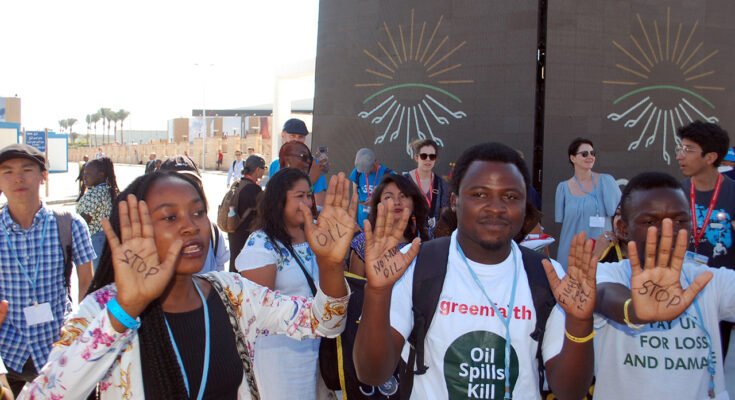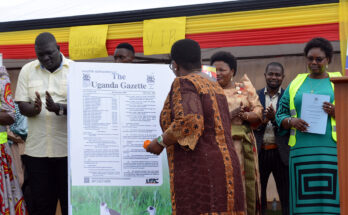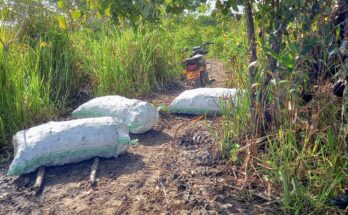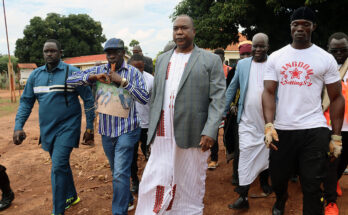This week on Tuesday as student activists, who were arrested for petitioning parliament over the East Africa Crude Oil Pipeline (EACOP), languished in Luzira Maximum Prison in Uganda, anti-fossil fuel activitists from across the globe were confronting Total CEO Patrick Pouyanné at the COP28 summit in Dubai, United Arab Emirates (UAE).
The climate activists, led by the coordinator of the Stop EACOP campaign, Zaki Mamdoo, questioned Pouyanne why “Total has been a party to the victims and bullying that has resulted in communities feeling coerced to sign over their land”. And as they demanded the release of the jailed students, they tasked Total to put an “end to violence and intimidation of environmental defenders”. But Total’s Pouyanne responded repeatedly that “this is what we’re doing today”.
Late last month, seven student activists were arrested for petitioning the Ugandan Parliament against the EACOP project – shining a light on the dangerous dissonance between Uganda’s oil ambitions and the urgent need for climate action.
The students, who were charged with inciting violence, were held in police custody for four days before being remanded to the Luzira Maximum Prison after the state prosecutor failed to appear in court on the 28th of November. They will be held at the prison until the 8th of December, 2023.
Bob Barigye, a climate activist who was arrested for holding a protest against the EACOP last year, accused the government of using “violence as a tool to suppress dissenting voices” against the EACOP project.
“They want to intimate the activists so that we stop talking about the EACOP,” said Barigye. “This is bad because our lives are at stake because of the dangers that this project poses for us”.
Barigye expressed determination saying they will continue holding protests until the government releases the jailed activists.
Brian Atuheire, Co-founder and Executive Director African Initiative on Food Security and Environment (AIFE), accused the government of “weaponising Uganda’s courts against climate activists” adding that they are simply “asserting themselves as legitimate stakeholders in protecting” the environment amid climate crisis.
Under a tightly controlled government under President Yoweri Museveni, who has ruled Uganda for the last 37, critics have been arrested under the Public Management Order Act and legislation and right-based organisations have been shut down for their dissenting voices.
Development groups have also raised alarm about the impacts on the climate – saying the pipeline will generate 34 million tonnes of carbon emissions annually – and on communities, as an estimated 14,000 households are at risk of losing their land. But climate campaigners are increasingly being targeted for that.
Dickens Kamugisha, Executive Director of the African Institute of Energy and Governance (AFIEGO) – whose organisation was once shut down in 2021, said the arrests of activists are meant to instill fear in the activists so that they stop holding the government accountable for the environmental damage the project will cause.
“The law in Uganda is bogus because it is being used to silence activists,” he said. “The government wants the activists to back off by arresting them on flimsy grounds”.
Internal affairs ministry spokesperson Simon Peter Mundeyi denied that the government wanted to “silence activists” adding they were “not following the law and procedures of holding a protest”.
Police Spokesperson Fred Enanga said in a phone interview that the climate activists were arrested because they were “creating an environment that would disrupt businesses in the city” adding this would make “other people take the opportunity to commit crimes”.
StopEACOP’s Mamdoo said that unlawful arrests of environmental defenders in Uganda “serves as a reminder of the violence that is so characteristic of extractive industry all across the world and within the global South and Africa in particular”
As they called for phasing out fossil fuels at COP28, Mandoo added that the fossil fuel industry needs to be held accountable for putting profit over people.
“Total needs to not only make good its call for the release of our activists but also halt this harmful project altogether,” he said.
This story was produced with assistance from MESHA and IDRC Eastern and Southern Africa Office for science journalists reporting on COP28.




